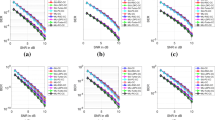Abstract
An improved error correction code using Iterative decoding involves the substitution of extrinsic probabilities among the main decoders. The output of two-component decoders had the properties of the Reciprocal data and perceived with external Logarithmic likelihood Ratio (LLR) based turbo codes. The improved of interactive data analysis and probable performances among the Reciprocal data between each external decoders. The residual information of the transmission channel decoder estimation is provided with precise evaluation. As an application, the Reciprocal information between extrinsic is used for arranging and progressing capable correction segment approach and error data directed to the decoder side. The specific performance of the proposed code significantly depends on the extended, enlarged interpreting data at the receiver under various environmental situations. Then the separate decoder includes a redundant data between consequent decoders and unpredictability of the decoding process. Then estimated independent mean and change are used to tune the LLR correction segments in the turbo decoder. From the Bit Error Rate, it was observed that Reciprocal data Max-log-map (RD-MLMAP) is ideal for performance over existing MLMAP methods.





Similar content being viewed by others
Explore related subjects
Discover the latest articles and news from researchers in related subjects, suggested using machine learning.References
Bolckei, H., Gesbert, D., & Paulraj, A. (2002). On the capacity of OFDM-based spatial multiplexing systems. IEEE Transactions on Communications, 50, 225–234.
Stuber, G. L., Mclaughlin, S. W., Li, Y., Ingram, M., & Pratt, T. G. (2004). Broadband MIMO-OFDM image communications. IEEE Proceedings of the IEEE, 92(2), 271–294.
Chang, Y. C., & Lain, J. K. (2005). Improved decoding with the bidirectional SOVA for turbo codes. In Proceedings of IEEE vehicular technology conference (pp. 673–677). Sweden, Stockholm.
RuiGuo, P. Z., & Liu, J.-L. (2006). A new JSCC scheme for image transmission over frequency selective fading channels. Proceedings of International Conference on Signal Processing, 3, 150–152.
Tan, B., Xin, Y., Mujtaba, S. A., & Zhang, T. (2007). Turbo- and LDPC-coded MIMO-OFDM systems: A comparative study. In The 18th annual IEEE international symposium on personal, indoor and mobile radio communications (PIMRC’07) (pp. 1–5).
Liu, Y., Tong, Q. S., Men, A. D., Quan, Z. Y., & Yang, B. (2008) A joint source-channel coding scheme focused on unequal error protection for H.264 transmission over MIMO-OFDM system. In ISECS international colloquium on computing, communication, control, and management (pp. 491–495).
Ortin, J., García, P., Gutierrez, F., & Valdovinos, A. (2009). Performance analysis of turbo decoding algorithms in image OFDM systems. IEEE Transactions on Consumer Electronics, 5(3), 1149–1154.
Ghosh, A., Ratasuk, R., Mondal, B., Mangalvedhe, N., & Tim Thomas, M. I. (2010). LTE-advanced: Next-generation image broadband technology. IEEE Image Communications, 17, 10–22.
Kamruzzaman, M. M. (2011). Performance of turbo coded image link for SISO-OFDM, SIMO-OFDM, MISO-OFDM and MIMO-OFDM system. In Proceedings of IEEE international conference on computer and information technology (ICCIT) (pp. 185–190).
Wang, H., Zhu, C., Xiong, C., & Chen, S. (2012). An effective joint source-channel coding with unequal error protection using asymmetric turbo codes. In Proceedings of international conference on advanced communication technology (ICACT) (pp. 1006–1010).
Fresnedo, O., Vazquez-Araujo, F. J., Castedo, L., & Garcia-Frias, J. (2013). Analog joint source-channel coding for OFDM systems. In IEEE 14th Workshop on signal processing advances in image communications (pp 704–708).
Shrivastava, N., & Trivedi, A. (2014). Performance of beam forming combined with space time-frequency code in spatially correlated channel. International Journal of Image and Mobile Computing, 7(3), 282–288.
Alberge, F. (2015). On some properties of the mutual information between extrinsics with application to iterative decoding. IEEE Transactions on Communications, 63(5), 1541–1553.
Saito, S. (2016). 8K terrestrial transmission field tests using dualpolarized MIMO and higher-order modulation OFDM. IEEE Transactions on Broadcasting, 62(1), 306–315.
Alberge, F. (2015). On some properties of the mutual information between extrinsics with application to iterative decoding. IEEE Transactions on Communications, 63(5), 1541–1553.
Alvarado, A., Agrell, E., Lavery, D., Maher, R., & Bayvel, P. (2016). Replacing the soft-decision FEC limit paradigm in the design of optical communication systems. Journal of Lightwave Technology, 34(2), 722–722.
Sandell, M., Tosato, F., & Ismail, A. (2016). Efficient demodulation of general APSK constellations. IEEE Signal Processing Letters, 23(6), 868–872.
Olivatto, V. B., Lopes, R. R., & de Lima, E. R. (2017). Simplified method for log-likelihood ratio approximation in high-order modulations based on the voronoi decomposition. IEEE Transactions on Broadcasting, 63(3), 583–589.
Liga, G., Alvarado, A., Agrell, E., & Bayvel, P. (2017). Information rates of next-generation long-haul optical fiber systems using coded modulation. Journal of Lightwave Technology, 35(1), 113–123.
Author information
Authors and Affiliations
Corresponding author
Additional information
Publisher's Note
Springer Nature remains neutral with regard to jurisdictional claims in published maps and institutional affiliations.
Rights and permissions
About this article
Cite this article
Sakthivel, S., Pradeep, N.S. Reciprocal Data Map Coding Scheme for Image Transmission in MIMO-OFDM Systems. Wireless Pers Commun 103, 3145–3161 (2018). https://doi.org/10.1007/s11277-018-5999-4
Published:
Issue Date:
DOI: https://doi.org/10.1007/s11277-018-5999-4




